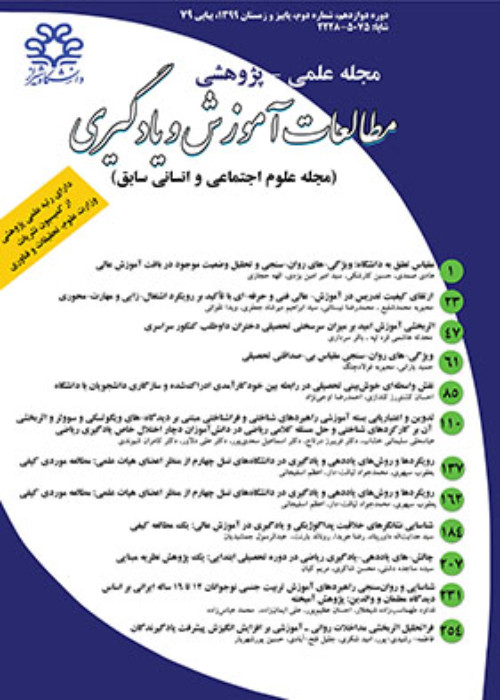A Study on the Effect of Metacognition, Self-Efficacy and Intelligence on the First Grade High School Student's Achievement
Author(s):
Abstract:
Introduction Academic achievement is one of the most important indicators for the success of educational systems. So, the study of factors related to student's achievement has become the focus of attention among educational psychologists. Some of these psychologists (e.g. Cho, 2010) point out that the intellectual ability is not the only factor necessary for one's academic achievement. Instead, they argue that success is the result of factors such as metacognitive skills and self-efficacy beliefs as well as intellectual ability. Metacognition was introduced by Flavell (1981) and defined as any knowledge of and activity about one's own cognition and also the regulation of cognition. Schraw and Dennison (1994) proposed that metacognitve awareness construct includes two dimensions of the knowledge of cognition and the regulation of cognition. Knowledge of cognition includes three different kinds of metacognitive awareness: declarative, procedural, and conditional knowledge. The regulation of cognition includes planning, information management strategies, comprehension monitoring, debugging strategies, and evaluation of learning processes. Self-efficacy was introduced by Bandura (1997) and defined as our belief in our ability to succeed in specific situations. Bandura (1997) has suggested that self-efficacy can have an impact on everything from psychological states to behaviors and motivation. Zimmerman (1990) found the effect of self-efficacy beliefs on the self-regulated processes and academic achievement. A great deal is known about the role of each of these factors in the academic achievement separately. However, educators know little about the contribution of each of them in predicting achievement. So, the purpose of this study was to investigate the role of metacognition, self-efficacy and intelligence in the academic achievement of high school students.Research Questions1- Among the variables of IQ, metacognition and self-efficacy, which one is the best predictor of academic achievement of the first grade high school students?2- Which components of metacognition have more contribution in predicting academic achievement of the first grade high school students?Method ParticipantsThe participants of the study included 298 students (123 females and 175 males) from the high schools of Dena in Kohgiluyeh -Boyerahmad Province selected through random cluster sampling.InstrumentsMetacognitive Awareness Inventory Scale (Schraw & Dennison, 1994) was used to assess metacognitive awareness of students. It's a 52 item questionnaire that consists of two components: metacognitive knowledge and the regulation of knowledge. It is based on a five-point Likert type scale ranging from strongly agree to strongly disagree. Self-efficacy Questionnaire (Pintrich & DeGroot, 1990) was applied as a measure of ability beliefs. It is a scale of nine items based on a five-point Likert type scale ranging from strongly agree to strongly disagree. Raven Intelligence Test (1938) was used to assess intelligence. Moreover, the final math and humanities exam scores were used to measure academic achievement. The reliability and validity of the questionnaires were also found to be satisfactory. ResultsThe results of multiple regression analysis revealed:1- Intelligence was the most powerful predictor of academic achievement (β = 0.51). Self-efficacy was the second (β = 0.16) and metacognition was the third (β = 0.11). 2- Among the metacognitive components, conditional knowledge (β = 0.19) and information management strategies (β = 0.23) significantly predicted academic achievement. The other components had no significant role in this regard.ConclusionThe result concerning the superiority of intelligence over metacognition and self-efficacy in predicting academic achievement is consistent with some previous findings and shows that in the familiar and repetitive tasks IQ is more important than metacognition. Moreover, this study indicated that the students who are equipped with conditional knowledge are more successful. They know how to learn better and when to use a strategy. Also, good students are those who use more information management strategies. These results may mean that students can be more successful if they are taught conditional knowledge and information management strategies. Among the limitations of the present study was the use of non-standardized tests for assessing academic achievement. It is suggested that future research use standardized test scores. Investigating the role of metacognition and self-efficacy as mediators for the relationship between IQ and academic achievement is suggested for future studies. Studying the casual role of metacognitive strategies in achievement is also another line of research.
Keywords:
Language:
Persian
Published:
Studies in Learning & Instruction, Volume:4 Issue: 2, 2012
Page:
117
https://magiran.com/p1151255
دانلود و مطالعه متن این مقاله با یکی از روشهای زیر امکان پذیر است:
اشتراک شخصی
با عضویت و پرداخت آنلاین حق اشتراک یکساله به مبلغ 1,390,000ريال میتوانید 70 عنوان مطلب دانلود کنید!
اشتراک سازمانی
به کتابخانه دانشگاه یا محل کار خود پیشنهاد کنید تا اشتراک سازمانی این پایگاه را برای دسترسی نامحدود همه کاربران به متن مطالب تهیه نمایند!
توجه!
- حق عضویت دریافتی صرف حمایت از نشریات عضو و نگهداری، تکمیل و توسعه مگیران میشود.
- پرداخت حق اشتراک و دانلود مقالات اجازه بازنشر آن در سایر رسانههای چاپی و دیجیتال را به کاربر نمیدهد.
In order to view content subscription is required
Personal subscription
Subscribe magiran.com for 70 € euros via PayPal and download 70 articles during a year.
Organization subscription
Please contact us to subscribe your university or library for unlimited access!



